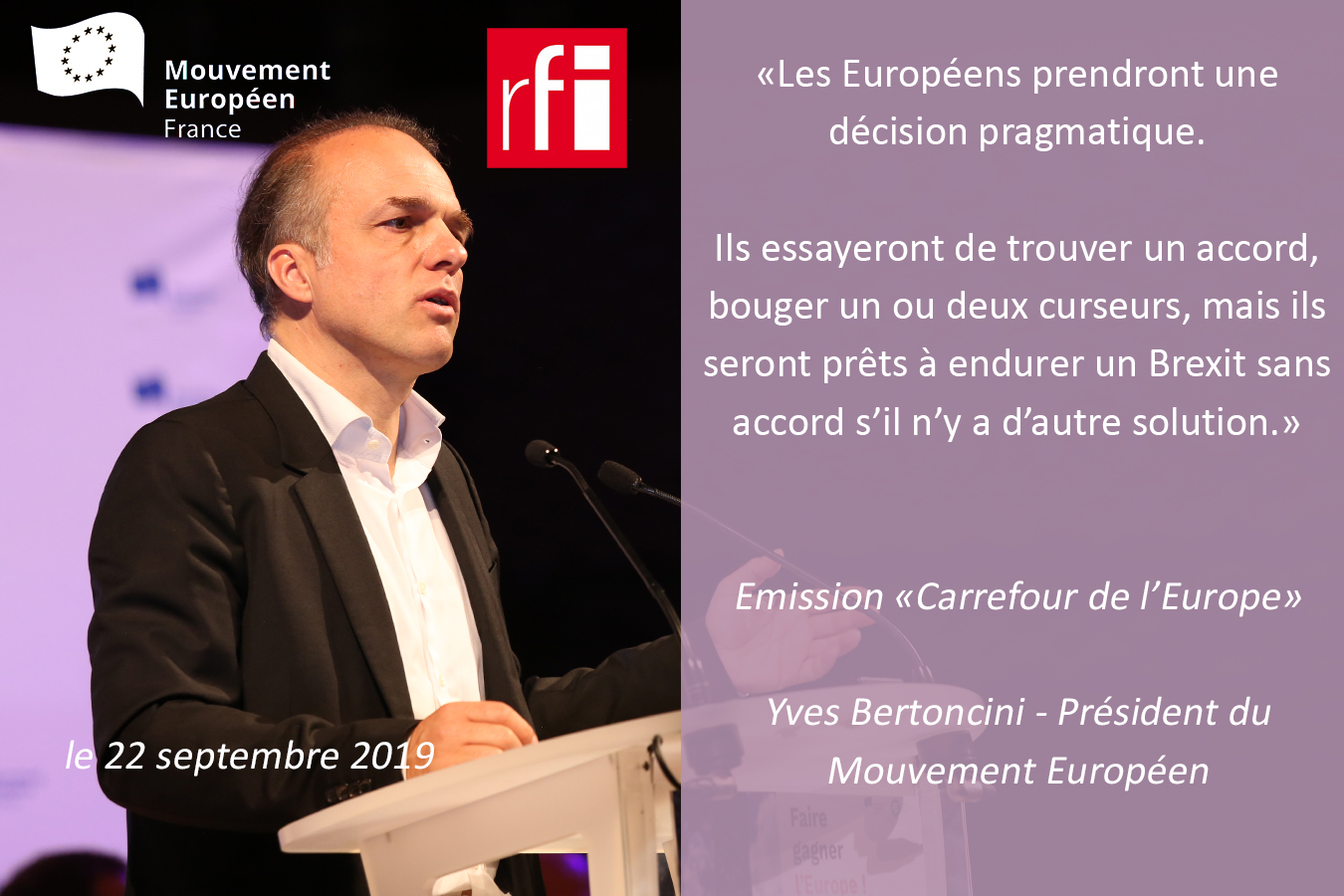On RFI: “Brexit, a series exasperating the 27”

Will Brexit ever take place? Brexit, the series that the most creative screenwriters of television series would never have imagined, is increasingly exasperating the other 27 countries of the Union, irritated and the word is weakened by the indecision of the British. But beyond the facts that this Brexit reveals in the English unconscious?
Yves Bertoncini, President of the European Movement – France, in debate with Pauline Schnapper, Professor of Contemporary British Civilization at Sorbonne Nouvelle University, and Philip Turle, journalist at RFI and France 24, in the programme “Carrefour de l’Europe” presented by Daniel Desesquelle on RFI.
European Exasperation
Yves Bertoncini, President of the European Movement – France, began by commenting on the recent press conference by Xavier Bettel, Prime Minister of Luxembourg. According to him, the frustration and exasperation he could not hide characterize the state of mind of most other European actors such as Michel Barnier or Emmanuel Macron. This emotion would harm the image of the European Union in the United Kingdom, as the British consider that the Union lacks flexibility in the negotiations.
The President of the European Movement – France underlines the doubts that exist about Boris Johnson’s ability to endorse “in a difficult parliamentary context” an amended version of the withdrawal agreement and his real desire to reach such an agreement. It may be that his strategy is precisely to move towards an exit without an agreement, for which he would blame the European leaders. “In this perspective, Xavier Better almost did him a favour. His speech makes us happy and reflects our exasperation, but it can be useful to Boris Johnson who would say’look, these people don’t know how to behave and don’t respect us”.
Lying poker game
Yves Bertoncini compares the situation to a lying and dangerous poker game: “Europeans, and in particular the French, would have to suffer from a Brexit without agreement”. Despite all the “dramaturgy” of the moment, he hopes that “European leaders will succeed, at least behind the curtain, in making a gesture and showing that they have made a gesture, and then endorse the consequences of a lack of agreement and a catastrophic exit. At least then Boris Johnson will have less of an ability to say that it is the EU’s fault”.
The President of the European Movement recalled that from a technical point of view, “we know where the cursor is and what can still be changed” in the agreement. On the other hand, from a political point of view, Boris Johnson’s willingness to find a solution appears uncertain. According to Yves Bertoncini, “the Europeans will take a pragmatic decision, they will try to find an agreement, move one or two sliders, but they will be ready to endure a Brexit without agreement if there is no other solution”. In addition, the disorder caused by an outing without an agreement would force the British to return to the negotiating table more quickly. Regardless of whether the divorce is negotiated or brutal, you need to talk to each other to define the continuation of the relationship.
Does British exceptionalism influence the negotiations?
Yves Bertoncini is convinced that the cultural, historical and geographical roots of the United Kingdom, which explain the lukewarmness and demagoguery of its political leaders on Europe, must be taken seriously – even if he quotes some rather pro-European leaders “in their own way” like Tony Blair and Margaret Thatcher. “This exceptionalism linked to the glorious past is the one that Boris Johnson sometimes calls for when he talks about England’s great hours, the continental blockade, the blitz… He tells a story – and it is part of his success – that can echo this national mythology: ‘We have seen others, and even if we have a Brexit without agreement, we will get over it'”.
Beyond these cultural elements, Yves Bertoncini recalled that there had been a major economic crisis, particularly in the United Kingdom, which had led to budget cuts and social regressions for which Europe was not responsible. Nor did the United Kingdom activate a safeguard clause at the time of the 2004 enlargement, which allowed free movement of workers from Central and Eastern Europe. “This has created tensions, including in popular circles”.
“The result of the referendum – unfortunate, but democratic – is therefore the result of a succession of reasons that would be difficult to find elsewhere in Europe”. The President of the European Movement – France does not believe that europhobia can express itself in the same way elsewhere on the continent, even Euroscepticism is also very present.